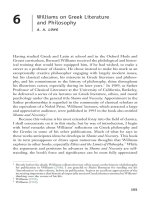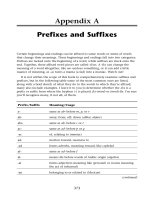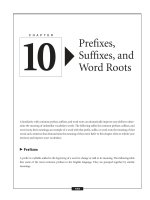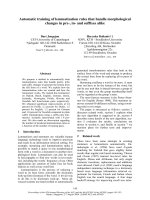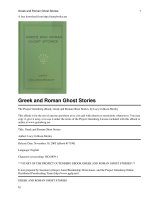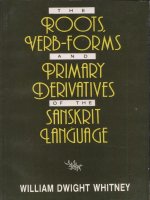Greek and Latin roots , prefixes and suffixes
Bạn đang xem bản rút gọn của tài liệu. Xem và tải ngay bản đầy đủ của tài liệu tại đây (345.6 KB, 49 trang )
GREEK AND LATIN ROOTS, PREFIXES, AND
SUFFIXES
This is a resource pack that I put together for myself to teach roots, prefixes, and
suffixes as part of a separate vocabulary class (short weekly sessions). It is a
combination of helpful resources that I have found on the web as well as some tips of
my own (such as the simple lesson plan).
Lesson Plan Ideas ........................................................................................................... 3
Simple Lesson Plan for Word Study: ........................................................................... 3
Lesson Plan Idea 2 ...................................................................................................... 3
Background Information .................................................................................................. 5
Why Study Word Roots, Prefixes, and Suffixes? ......................................................... 6
Latin and Greek Word Elements .............................................................................. 6
Latin Roots, Prefixes, and Suffixes .......................................................................... 6
Root, Prefix, and Suffix Lists ........................................................................................... 8
List 1: MEGA root list ................................................................................................... 9
List 2: Roots, Prefixes, and Suffixes .......................................................................... 32
List 3: Prefix List ....................................................................................................... 42
List 4: Greek Roots .................................................................................................... 43
List 5: Greek Prefixes ................................................................................................ 43
List 6: Greek Suffixes List .......................................................................................... 44
List 7: Latin and Greek word roots ............................................................................. 45
Sample Study Card ....................................................................................................... 47
Games/Activities ........................................................................................................... 48
Word Webs ................................................................................................................ 48
Nonsense Words ....................................................................................................... 48
Concentration ............................................................................................................ 49
Crossword Puzzles .................................................................................................... 49
Word Searches .......................................................................................................... 49
Hangman ................................................................................................................... 49
Jeopardy .................................................................................................................... 49
Quizzes ...................................................................................................................... 49
Tips ............................................................................................................................ 49
Lesson Plan Ideas
Study::
Simple Lesson Plan for Word Study
This is a simple plan I made up based upon what I came across on the web:
1. Choose one (or two) new root(s), prefix(es), or suffix(es) a week to learn
2. Have student list as many words as he/she can with the target root, prefix or
suffix.
3. Create a study card as shown near the end of this document.
4. Play games or other activities to practice the root, suffix, or prefix.
5. Work in regular review of all previous roots. You might make a warm up activity
or give a quiz at the beginning of each session.
Lesson Plan Idea 2
Excerpted from:
Learning How to Define and Use Root Words
/>
Procedure: Students will be grouped into groups of four. Each group will be
given 10 of the roots from the master list provided by the instructor; each
group will get different roots from the master list. Students in each group will
use a marker to write each of the 10 roots on an index card. Students will
think of two or three words that use the root and write each of these words on
the opposite side of the index card. They will write the definition next to each
word. (If they are unsure of the definition, they will be allowed to use the
dictionary.) They will then attempt to find the similarity for each word; in this
way they will attempt to define the root. Example: the students write “ject”
on one index card. On the reverse side, they may come up with “inject”,
“reject”, and “project”. Students may discuss that all three words have
something to do with movement. Moving “in”, moving “back” and moving
“forward”. Students may then infer that “ject” means to “move” or to “throw”.
“Inject”=throw in, “reject”=throw back, “project”=throw forward. (Time
permitting, students should be encouraged to write on the card one or two
more complex words using “ject”e.g. “projection”, “conjecture”, “objection”.
Students in each group will then pair, and each pair will follow the same
procedure for each of the five roots they have chosen. The two pairs of
students will then share their findings and write their ten roots and definitions
in their notebooks (or on the master list). If there is time remaining, the four
students will use an open sorting technique to sort their ten roots. For
example, they might group by roots that are verbs and roots that are
adjectives (e.g. “ject” “pel” “cred” “scope” “aud”=verbs; “bio” “belli”
“fort” “therm” “temp(o)”=nouns.
The time frame for this activity should be 45-50 minutes, one class period.
(For subsequent activities involving the same lesson, the groups would share
their findings with the class for the next day or two, until all the roots are
defined. A possible final activity at this point, instead of a test, would be for
each student to group all of the roots from the master list using an open sort.
This, again, could be instead of a test, or this could be used as a study
mechanism for each student to learn the meaning of the roots for a test, as
studies show that grouping improves the learning process.)
Evaluation:
• The instructor will give students a list of new words using the roots defined by
each group. The students will attempt to define these words without the use
of dictionaries.
• Students will create “nonsense words” using a combination of the roots
learned and be able to define these words: e.g. ‘biocredography”= a
believable book about someone’s life; “thermoscope”=a device that lets you
see the heat given off by an object.
• A more standard evaluation would be a test on the roots where the student
would be given a series of roots; he would have to first define the root, then
use a word that uses the root, then define the word: e.g. “”belli”=war,
“belligerent”, “belligerent”=a “warlike” person, an aggressive person.
Background Information
Read over the information on the next two pages with student before starting word study
so he/she can understand the importance/significance or reason for undertaking this
study.
Prefixes,, and Suffixes?
Why Study Word Roots, Prefixes
Knowing the "building blocks" of the English language - prefixes, suffixes and root
words - helps you to understand a word's meaning and spelling convention.
Latin and Greek Word Elements
/>
English is a living language, and it is growing all the time. One way that new words
come into the language is when words are borrowed from other languages. New words
are also created when words or word elements, such as roots, prefixes, and suffixes,
are combined in new ways.
Many English words and word elements can be traced back to Latin and Greek. Often
you can guess the meaning of an unfamiliar word if you know the meaning.
A word root is a part of a word. It contains the core meaning of the word, but it cannot
stand alone.
A prefix is also a word part that cannot stand alone. It is placed at the beginning of a
word to change its meaning.
A suffix is a word part that is placed at the end of a word to change its meaning.
Often you can guess the meaning of an unfamiliar word if you know the meaning of its
parts; that is, the root and any prefixes or suffixes that are attached to it.
Latin Roots, Prefixes, and Suffixes
/>
Latin was the language spoken by the ancient Romans. As the Romans conquered
most of Europe, the Latin language spread throughout the region. Over time, the Latin
spoken in different areas developed into separate languages, including Italian, French,
Spanish, and Portuguese. These languages are considered “sisters,” as they all
descended from Latin, their “mother” language.
In 1066 England was conquered by William, duke of Normandy, which is in northern
France. For several hundred years after the Norman invasion, French was the language
of court and polite society in England. It was during this period that many French words
were borrowed into English. Linguists estimate that some 60% of our common everyday
vocabulary today comes from French. Thus many Latin words came into English
indirectly through French.
Many Latin words came into English directly, though, too. Monks from Rome brought
religious vocabulary as well as Christianity to England beginning in the 6th century.
From the Middle Ages onward many scientific, scholarly, and legal terms were borrowed
from Latin.
During the 17th and 18th centuries, dictionary writers and grammarians generally felt
that English was an imperfect language whereas Latin was perfect. In order to improve
the language, they deliberately made up a lot of English words from Latin words. For
example, fraternity, from Latin fraternitas, was thought to be better than the native
English word brotherhood.
Many English words and word parts can be traced back to Latin and Greek.
Root, Prefix, and Suffix Lists
1:: MEGA root list
List 1
This is a long list of roots. Super comprehensive. Includes examples.
Root
Meanings
a/n
not, without
a
on
Sample Words and Definitions
abyss - without bottom; achromatic - without color; anhydrous - without
water
afire - on fire; ashore - on the shore; aside - on the side
abduct - carry away by force; abnormal - away from normal, not normal;
ab/s, a
from, away, off
absent - away, not present; aversion - the act of turning away from;
abbreviate: to shorten.
ac, ad
acro
to, toward, near
acrobat - a "high walker"; acronym - a word formed from the first (capital)
beginning
letters of a word; acrophobia - fear of height
do
aer/o
air
agr/i/o
farming
alg/o
pain
ambi,
both, on both sides,
amphi
around
ambul
walk, move
ami/o
love
andr/o
approached, or obtained; admittance - allowing into;
top, height, tip,
act
ana
accelerate - to increase the speed of; accessible - easily entered,
up, back, against,
again, throughout
man, male
activity - something that a person does; react - to do something in response;
interaction - communication between two or more things
aerate - to let air reach something; aerial - relating to the air; aerospace - the
air space
agriculture - management of the land, agribusiness - making money by
utilizing land; agrarian - relating to the management of land
neuralgia - pain caused by a nerve; analgesic - a drug that makes one pain
free; nostalgia - aching for the familiar
ambidextrous - able to use both hands equally; ambiguous - having more
than one meaning; ambivalence - conflicting or opposite feelings toward a
person or thing
amble - to walk in a slow, relaxed way; ambulant - walking or moving
around; ambulance - a vehicle that moves a patient
amiable - friendly, pleasant, lovable; amity - friendly and peaceful relations;
amorous - showing romantic love
analysis - a close examination of something; anatomy - the structure of
something as visible when cut up for analysis; anachronism - not being in
the right place in time
androgynous - being both male and female; android - resembling a human;
misandry - hatred towards men
anim
life, spirit
ann enn
year
ante
before, in front
animal - a living organism; animate - to make alive; equanimity - of balanced
spirit
anniversary - a date observed once a year; annual - happening once a year;
millennium - 1,000 years
antecede - to come before something in time; antemeridian - before noon;
anteroom- a small room before the main room
chrysanthemum and amaranth - names of flowers; anthology - a collection of
anth/o
flower
treasured writings; anthozoan - half plant, half animal, like anemones and
corals.
anthropology - the study of mankind; anthropomorphism - giving human form
anthrop/o human
to non-human things; philanthropy - the love to mankind (expressed through
good deeds)
anti
against, opposite of
antibody - a substance that destroys micro-organisms; antiseptic preventing infection; antisocial - opposing social norm
aphorism - a short expression of a general truth; apology - an explicit
apo, apho away, off, separate expression of regret, apostrophe - a small dash used in place of an omitted
letter
aquarium - a water container for fish; aquatic- relating to water; aqueduct - a
aqu/a
water
arbor
tree
arch/i
chief, most
archbishop - the highest ranking bishop; archenemy - chief or worst enemy;
/e/o/ae
important, rule
matriarch - a female who rules a group; monarch - a king or queen
archa/e,
archi
primitive, ancient
pipeline for water
arborist - someone working with trees; arbor - a shady area formed by trees;
arborous - having many trees
archaeology - the study of ancient cultures; archaic - belonging to an earlier
period; archive - a collection of historical materials
arthroscope - a tool to see inside a joint; arthritis - inflammation of a joint;
arthr/o
joint
art
skill
astro,
star, stars, outer
astronaut - a person traveling to the stars; astronomer - someone who
aster
space
studies the stars; asterisk - a star-shaped sign used as a reference tool
aud/i/io
hear
arthropod - invertebrates with jointed legs, like spiders, crustaceans, insects
artifact - object made by a person's skill; artisan - a person skilled in a craft;
artist - a person who creates skillfully
audible - loud enough to be heard; audience - people who listen to a
program; audiovisual - relating to sound and vision
auto
self, same, one
avi/a
bird
bar/o
pressure, weight
bell/i
war
bene
good, well
bi/n
person's own signature; automatic - moving by itself
aviary - a large enclosure for birds; aviatrix - a female airplane pilot; aviation
- the art of designing or operating aircraft
baric - pertaining to pressure, esp. of the atmosphere; milliard - metric unit,
equal to 1/1000th of a bar; baryon - heavy elementary particle
bellicose - warlike; belligerent - hostile, ready to fight; rebel - person who
opposes and fights
benefactor - person who gives money to a cause; beneficial - producing a
good effect; benevolent - showing kindness or goodwill
two, twice, once in biannual - happening twice a year; binoculars - optical device with two
every two
bibli/o
book
bio
life, living matter
blast/o
autocrat - a person who governs with absolute power; autograph - a
cell, primitive,
immature cell
capt, cept take, hold
cardi/o
heart
carn/i
flesh, meat
lenses; bilateral - of or involving two sides
bibliography - a list of books used as sources; bibliomania - an extreme love
of books; bibliophile - a person who loves books
biography- a life story written by another person; biology - the science of life;
biosphere - Earth's surface inhabited by living things
blastula - an early stage of embryonic development; fibroblast - a cell that
forms connective tissue; blastoderm - the layer surrounding the inside of an
egg
intercept - to stop or interrupt; recapture - taking something back; captivating
- taking hold of
cardiac - relating to the heart; cardiogenic - resulting from heart disease;
cardiologist - a heart doctor
carnivorous - flesh-eating; carnal - pertaining to the body or flesh; incarnate given bodily form
down, against
cata
completely,
cataclysm - a flood or other disaster, catalog - a complete listing;
intensive,
catastrophe - turning for the worst, a substantial disaster
according to
caust,
caut
to burn
cede,
ceed,
cess
cauterize - to burn with a hot instrument; caustic - capable of burning or
eating away; holocaust - total devastation, especially by fire
exceed - to go beyond the limits; recede - to go back; accessible - easily
go, yield
entered, approached,
or obtained;
ceive,
cept
take
celer
fast
cent/i
hundred, hundredth
centr/o/i
center
accept - to take a thing that is offered; perceive - to take notice of something;
receive - to take something given
accelerate - to increase the speed of; decelerate - to reduce the speed of
centennial- the 100th anniversary; centimeter - 1/100 of a meter; century 100 years
egocentric - self-centered; eccentric - not having a common center, not
according to norm; centrifugal - moving outward from a center
encephalitis - inflammation of the brain; cephalic - pertaining to the head;
cephal/o
head
cephalopod - marine mollusks like octopus and squid who have tentacles
growing from their head
cerebr/o
brain
cert
sure
chrom/o
chromat/o, color, pigment
chros
chron/o
time
chrys/o
gold, yellow
cide, cise cut, kill
circum,
circle
claim,
clam
clar
around, about
shout, speak out
clear
clud, clus close
cline
lean
cerebral - pertaining to the brain; cerebrate - to use the brain; cerebrospinal pertaining to the brain and the spinal cord
ascertain- to find out something with certainty; certain - being absolutely
sure; certify - to state that something is true
achromatic - without color; chromium - a blue-white metallic chemical
element, chromatics - the study of color
chronic - lasting for a long time; chronological - arranging events in time
order, synchronize - happening at the same time
chrysanthenum and helichrysum - golden/yellow flowers; chrysolite - a
yellowish gem
homicide - murder; incisor - a sharp tooth for cutting food; insecticide - a
chemical used to kill insects
circumnavigate - to sail around; circumscribe - to draw around; circumspect looking around
clamor - to shout and make noise; exclaim - to cry out loudly and suddenly;
proclamation - something announced officially in public
clarification - an explanation; clarify - to make something clear; declare - to
state something clearly
conclusion - the end or last part; exclusion - shutting out, rejecting; seclude to keep away from; to isolate
inclination - a leaning toward; incline - a surface that slopes or leans; recline
- to lean back and relax
coauthor - writer who collaborates with another author; coeducation co
with, together, joint educating males and females together; cohousing - planning your
neighborhood in an intentional neighborly fashion
col
together, jointly
Collaborate - to work together; collision - smashing together; colloquial words formed by everday interaction
commemorate - to memorize together; composition - an arrangement or
com
together, common putting together of parts; commune - living together while owning things in
common
cogn/i
know
con
with, jointly
contra/o
against, opposite
corp/o
body
cosm/o
universe
counter
opposing
skull
cred
believe
crypto
hidden, secret
cumul
mass, heap
cycl
circle, ring
dec/a,
deka
knows you; recognize - to discover that one knows
concur - to agree with someone; contemporary - of the same time period as
others; convention - a gathering of people with a common interest
contradict to argue against, Contraflow, contraception, contrary not in
agreement, controversy disagreement
corporation - a company recognized by law as a single body; corpse - a
dead body; corporal - pertaining to the body
cosmonaut - a Russian astronaut; cosmos - the universe; microcosm - a
miniature universe
opposite, contrary, counteract - to oppose the effects of an action; countermand - to cancel a
cranio
de
cognition - process of acquiring knowledge; incognito - disguised so no one
previous order; counteroffensive - attack against an attack
craniology - the study of skull characteristics; cranium - skull of vertebrates;
cranial - pertaining to the skull
credence - belief that something is true or valid; credulous - believing things
too easily, gullible; incredible - unbelievable
cryptic - of hidden meaning; cryptography - science of secret codes; encrypt
- encode into secret code
accumulate - to gather or pile up; cumulative - gradually building up
bicycle - a vehicle with two wheels; cycle - a sequence that is repeated;
cyclone - a storm with circling winds
reduce, away,
decelerate - to slow down, reduce speed; dethrone - to remove from power;
down, remove
debug - to remove bugs
decade - 10 years; decathlon - athletic contest that includes 10 disciplines in
ten
which each participant competes; December - formerly the 10th month of the
Roman calendar
deci
one tenth
dem/o
people
demi
half, less than
deciliter - a tenth of a liter; decimate - reduce dramatically; decibel - one
tenth of the sound volume unit bel
democracy - government of the people; demographic - the study of people;
epidemic - spreading among people in a region
demitasse - a small cup of coffee; demimonde - someone of little respected
life style
philodendron - a climbing plant that grows on trees; dendrochronology -
dendr/o/i tree
dating events by studying growth rings in trees; dendriform - in the shape of
a tree
dent, dont tooth
derm/a
skin
dental - relating to teeth; dentist - a doctor for the teeth; dentures - a set of
false teeth
dermatologist - a doctor for the skin; pachyderm - a class of animals with
very thick skin (elephant, rhinoceros); dermatitis - inflammation of the skin
dichromatic - displaying two colors; diploma - a certificate, literally "a letter
di/plo
two, twice
folded double"; dilemma - a situation that requires a choice between two
alternatives.
di/s
dia
apart, away,
not, to the opposite out of sight; dissect - to cut apart piece by piece.
through, between,
apart, across
dict
speak
domin
master
don/at
give
duc/t
lead
du/o
two, twice
dur
digression - a departure from the main issue, subject; disappear - to move
diabetes - disease characterized by excessive thirst and discharge of urine;
diagnosis - understanding a condition by going through a detailed review of
symptoms; dialog - conversation between two people.
contradict - to express the opposite of; prediction - a statement foretelling
the future; dictate - to speak out loud for another person to write down.
dominate - to be the master of; domineering - excessively controlling;
predominate - to have more power than others
donation - a contribution or gift; donor - someone who gives something;
pardon - to give forgiveness for an offense
conduct - to lead musicians in playing music; educate - to lead to
knowledge; deduction - a subtraction of an amount.
duplicate - make an identical copy; duet - a musical composition for two
voices or instruments; duo - a pair normally thought of as being together.
harden, to last,
durable - having the quality of lasting; duration - the length of time something
lasting
lasts; enduring - able to last.
dyn/a/am
dys
power, energy,
dynamo - a generator of energy; dynamic - having physical energy/power;
strength
dynamite - a powerful explosive.
abnormal, bad
dyspepsia - abnormal indigestion; dystopia - an imaginary place of total
misery; dyslexia - impairment of the ability to handle words.
eloquent - speaking beautifully and forcefully; emissary - a representative of
e-
out, away
ego
self
em, en
a country or group sent on a mission; eject - throw out forcefully.
egoistic - self-centered; alter ego - a higher aspect of oneself; egomania excessive preoccupation with oneself.
into, cover with,
empathy - intention to feel like another person; empower - put into power;
cause
engorge - make larger.
endotherm - a creature that can keep its inside temperature fairly constant;
endo
within, inside
endocrine - relating to glands that secrete directly into the blood or lymph;
endogamy - the custom to marry within one's clan, tribe etc.
bicentennial - of or relating to an age or period of 200 years; centennial - of
enn/i, anni years
or relating to an age or period of 100 years; perennial -lasting through many
years.
en, in
inside, inwards
on, upon, over,
ep/i
among, at, after,
to, outside
equ/i
equal, equally
envision - to picture in the mind; enclose - lock inside; inwards - towards the
inside.
epidemic - the rapid spread of something negative; epilogue - a short
speech delivered after a play; epicenter - the center of an earthquake.
equidistant - an equal distance from two points; equanimity - calm
temperament, evenness of temper; equation - a statement of equality.
ergonomics - study of the working environment; energy - the power to
erg/o
work
accomplish work; energetics - science that looks at energy and its
transformation.
esth/aesth
feeling, sensation, esthetician - someone who beautifies; aesthetic - pertaining to a sense of
beauty
ethno
race, people
eu
good, well
ex
from, out,
beauty; kinesthesia - the sensation of bodily movement.
ethnic - pertaining to a defined group of people; ethnocentric - focusing on
the ethnicity of people; ethnology - the science of people and races.
euphemism - replacing an offensive word with an inoffensive one;
euphonious - having a pleasant sound; euphoria - feeling of well-being.
excavate - to dig out; exhale - to breathe out; extract - to pull out.
extra,
extro
outside, beyond
fac/t
make, do
fer
bear, bring, carry
fid
faith
flect
bend
flor/a,
fleur
flower
extraordinary - beyond ordinary; extraterrestrial - outside the Earth; extrovert
- an outgoing person.
artifact - an object made by a person; factory - a place where things are
made; malefact - a person who does wrong.
confer - to bring an honor to someone; ferry - a boat that carries passengers;
transfer - to move to another place.
confide - place trust in someone, fidelity - faithfulness; fiduciary - a trustee;
deflect - to bend course because of hitting something; inflection - a bending
in the voice's tone or pitch; flexible - easily bending.
florist - someone working with flowers; floral - flowerlike; flora - the plant life
of a particular time or area
completely (used to
for
intensify
forsaken or forfeited - completely lost; forgiven - completely given (a release
the meaning of a
of debt).
word)
fore
in front of,
forebear - ancestor; forebode - to give an advance warning of something
previous, earlier
bad; forecast - a preview of events to be.
fract, frag break
fug
fracture - a break; fragile - easy to break; fragment or fraction - a part or
element of a larger whole;
flee, run away,
fugitive - a person who is running away; refuge - a sheltered place to flee to;
escape
refugee - a person seeking protection
funct
perform, work
fus
pour
gastr/o
stomach
gen/o/e/
birth, production,
genesis
formation, kind
geo
earth, soil, global
ger
old age
defunct - no longer working or alive; function - to work or perform a role
normally; malfunction - to fail to work correctly.
confusion - being flooded with too much information that is hard to make
sense of; fuse - to melt by heating; infuse - to put into.
gastric - pertaining to the stomach; gastronomy - serving the stomach by
providing good food; gastritis - inflammation of the stomach.
genealogy - the study of the history of a family; generation - all the people
born at approximately the same time; genetic -relating to heredity encoded
in the genes.
geography - study of the earth's surface; geology - study of the structure of
the earth; geoponics - soil based agriculture.
geriatrics - medicine pertaining to the elderly; gerontocracy - the rule of the
elders; gerontology - the science of aging.
giga
a billion
gon
angle
gram
letter, written
graph/y
written
pleasing
gyn/o/e
woman, female
grad/e/i
hect/o,
hecat
helic/o
billion Hz/sec); gigawatt unit of electric power (one billion watts).
decagon - a polygon with 10 angles; diagonal - a slanting line running across
a space; octagon - a geometrical figure with 8 angles.
diagram - a simple drawing; grammar - rules of how to write words in
sentences; telegram - a message sent by telegraph.
writing, recording, Graphology - the study of handwritings; autograph - written with one's own
grat
gress,
gigabyte - unit of computer storage space; gigahertz - unit of frequency (one
to step, to go
hundred
spiral, circular
hand; seismograph - a machine noting strength and duration of earthquakes.
gratify - to please someone; grateful - feeling thankful; gratuity - a tip, token
of appreciation.
gynecology - the science of female reproductive health; gynephobia - fear of
women; gynecoid - resembling a woman.
digression - a departure from the main issue, subject, etc.; progress movement forward or onward; gradual - step by step.
hectoliter - 100 liters; hectare - metric unit equaling 100 ares or 10,000
square meters; hectometer - 100 meters.
helicopter - an aircraft with horizontal rotating wing; helix - a spiral form;
helicon - a circular tuba.
heliotropism - movement or growth in relating to the sun; heliograph -
heli/o
sun
apparatus used to send message with the help of sunlight; helianthus genus of plants including sunflowers.
hemi
half, partial
hem/o/a
blood
hepa
liver
hemicycle - a semicircular structure; hemisphere - one half of the earth;
hemistich - half a line of poetry.
hemorrhage - clotting of the blood; hemorrhoids - swelling of the blood
vessels; hemoglobin - red blood particle.
hepatitis - inflammation of the liver; hepatoma - a tumor of the liver;
hepatotoxic - toxic and damaging to the liver.
heptagon - a shape with seven angles and seven sides; Heptateuch - the
hept/a
seven
first seven books of the Old Testament; heptameter - a line of verse
consisting of seven metrical feet.
herbi
grass, plant
hetero
different, other
herbicide - any chemical used to kill unwanted plants, etc.; herbivorous plant-eating; herbal - relating to plants.
heterogeneous - made up of unrelated parts; heteronyms - words with same
spelling but different meanings; heterodox - not conforming to traditional
beliefs.
hex/a
six
histo
tissue
homo,
homeo
like, alike, same
hexagon - a shape with six angles/sides; hexameter - a verse measured in
six; hexapod - having six legs.
histology - study of the microscopic structure of tissues; histochemistry study of the chemical constitution of cells and tissues.
homogeneous - of the same nature or kind; homonym - sounding alike;
homeopath - a therapy that is based on treating "same with same"
hydrate - to add water to; hydrophobia - intense fear of water; hydroponics -
hydr/o
liquid, water
growing plants in liquid nutrient solution; hydraulic - operated by force
created by a liquid.
hygr/o
hyper
moisture, humidity
too much, over,
hygrometer - tool used to measure humidity; hygrograph - instrument for
recording variations in atmospheric humidity.
hyperactive - very restless; hypercritical - too critical; hypertension - above
excessive, beyond normal pressure.
hypoglycemia - an abnormally low level of sugar in the blood; hypothermia -
hyp/o
under
abnormally low body temperature; hypothesis - a theory that is unproven but
used under the assumption that it is true.
iatr/o
medical care
geriatrics - medical care of the elderly; pediatrician - a doctor who treats
children; podiatry - medical care for feet.
icon - an (often religious) image, in modern usage a simplified graphic of
icon/o
image
high symbolic content; iconology - science of symbols and icons; iconoclast someone who destroys religious images and traditional beliefs.
idio
il, in
ig, il, im,
in, ir
peculiar, personal,
distinct
in, into
not, without
imag
likeness
infra
beneath, below
idiomatic - Peculiar to a particular language; idiosyncracy - a physical or
mental characteristic typical or a particular person; idiot - someone who is
distinctly foolish or stupid.
illuminate - to give light to; innovation - a new idea, method, or device;
inspection - the act of examining or reviewing.
illegal - not legal; impossible - not possible; inappropriate - not appropriate;
irresponsible - not responsible.
image - a likeness of someone; imaginative - able to think up new ideas or
images; imagine - to form a picture or likeness in the mind.
infrastructure - underlying framework of a system; infrared - below the
regular light spectrum.
inter
intra,
intro
ir
between, among,
international - involving two or more countries; intersection - place where
jointly
roads come together; intercept - to stop or interrupt the course of.
within, inside
not
intrastate - existing in one state; intravenous - inside or into a vein; introvert shy person who keeps within him/herself.
irredeemable - not redeemable; irreformable - not reformable; irrational - not
rational.
isobar - a line on a map connecting points of equal barometric pressure;
iso
equal
isometric - having equality of measure; isothermal - having equal or constant
temperature.
ject
throw
jud
law
junct
join
juven
young
kilo
thousand
kine/t
/mat
motion, division
judgment - a decision of a court of law; judicial - having to do with judges or
courts of law; judiciary - a system of courts of law.
conjunction - a word that joins parts of sentences; disjunction - a
disconnection; junction - a place where two things join.
juvenile - youthful or childish; rejuvenate - to bring back to youthful strength
or appearance.
kilobyte - 1,000 bytes; kilometer - 1,000 meter; kilograms - 1,000 grams.
ability to move objects with your mind; cinematography - motion picture
making.
work
lact/o
milk
later
side
leuc/o
discussion; project - to cast or throw something.
kinetics - study of the force of motion; psychokinesis or telekinesis - the
lab
leuk/o,
eject - to throw someone/something out; interject - to throw a remark into a
white, colorless
lex
word, law, reading
liber
free
lingu
language, tongue
collaborate - to work with a person; elaborate - to work out the details;
laborious - requiring a lot of hard work.
lactate - to give milk, nurse; lactose - the sugar contained in milk; lactic acid.
bilateral - of or involving two sides; unilateral - affecting one side of
something.
leukemia - abnormal increase of white blood cells in the blood; leukocyte - a
mature white blood cell; leucine - a white, crystalline amino acid.
lexicology - the study and history of words; alexia -loss of the ability to read;
illegal - not authorized by the official rules or laws.
liberate - to set free; libertine - a person with a free, wild lifestyle; liberty freedom.
linguist - one who studies languages; multilingual - able to communicate in
multiple languages; linguine - long, flat "tongue-shaped" pasta.
lip/o
lite, ite,
lith/o
loc
log/o
fat
mineral, rock, fossil
place
liposuction - the mechanical removal of fat reserves in the tissue; lipase enzyme that breaks down fat; lipoid - resembling fat.
appatite - a group of common minerals; granite - a hard, granular rock;
monolith - a remarkable, unique stone.
dislocate - to put something out of its usual place; location - a place;
relocate - to move to a new place.
word, doctrine,
logic - correct reasoning; monologue - a long speech by one
discourse
speaker;analogy - similarity, especially between things otherwise dissimilar.
loqu, locu speak
luc
light
lud, lus
to play
lumin
light
lun/a/i
moon
macro
large, great
magn/a/i
great, large
eloquent - speaking beautifully and forcefully ; loquacious - very talkative;
elocution - art of public speaking.
elucidate - to explain, to throw light on; lucid - easily understood, giving off
light; translucent - allowing light through.
prelude - introduction to the major performance; illusion - misleading optical
image or impression; delude - to mislead, deceive.
illuminate - to fill with light; lumen - unit measuring light.
lunar - relating to the moon; lunarscape - the surface of the moon; lunatic insane (as if driven mad by the moon).
macroevolution - large scale evolution; macromolecule - a large molecule;
macroeconomics - study of the overall forces of economy.
magnify - make larger; magnificent - grand; magnate - a powerful person,
especially in business or industry.
malcontent - wrong content; malaria - "bad air", infectious disease thought to
mal/e
bad, ill, wrong
originate from the "bad air" of the swamps, but caused by the bite of an
infected mosquito; malicious - showing strong ill will.
man/i/u
hand
mand
to order
mania
mar/i
maneuver - to move by hand; manual - done with the hands; manuscript - a
book written by hand.
command - an order or instruction; demand - a hard-to-ignore order;
mandate - an official order.
madness, insanity, bibliomania - a crazy love of books; egomania - a mad love of oneself;
excessive desire
sea
maniac an insane person.
marina - a harbor for pleasure boats; maritime - relating to the sea;
submarine - an undersea boat; aquamarine - blue-green in color, like sea
water.
mater,
matr/i
mother
max
greatest
medi
middle
mega
great, large, million
melan/o
black
maternal - relating to motherhood; maternity - the state of being a mother;
matriarch - a woman head of a household.
maximal - the best or greatest possible; maximize - to make as great as
possible; maximum - the greatest amount.
medieval - pertaining to the Middle Ages; medium - in the middle; mediocre only of medium (inferior) quality.
megalopolis - an area with many nearby cities; megaphone - a device that
projects a loud voice; megastructure - huge building or other structure.
melancholy - a state of dark emotions; melanoma - malignant dark tumor of
the skin; melodrama - a dark, pathetic drama.
commemorate - to honor the memory of, as by a ceremony; memorial -
memor/i
remember
related to remembering a person or event; memory: an ability
to retain
knowledge or an individual's stock of retained knowledge.
merge,
mers
meso
meta
meter,
metr/y
micro
dip, dive
middle
change, after,
beyond, between
measure
immerge or immerse - to put or dip something into a liquid; submerge to dip
something completely into wate.r
Mesoamerica - Middle America; meson - elementary particle with a mass
between an electron and a proton.
metaphysics - study of nature and reality; metamorphosis - a complete
change of form; metastasis - the transmission of disease to other parts of
the body.
audiometer- an instrument that measures hearing acuteness; chronometeran instrument that measures time; metric - measured.
very small, short,
microbe - a very small living thing; microchip - a tiny wafer with an integrated
minute
circuit; microscope - a device to see very small things.
mid
middle
migr
move
milli
onethousandth
min/i
small, less
midriff - the area between the chest and the waist; midterm - middle of a
term in school; midway - halfway between.
immigrant - a person who moves to a new country to settle; migrant - person
who moves from place to place; migration - the process of moving.
millimeter - one thousandth of a meter; millibar - one thousandth of a bar;
milliliter - one thousandth of a liter.
mini - something that is very small; minuscule - extremely tiny; minutiae very small or trivial details.
bad, badly, wrong,
mis/o
wrongly,
to hate
miss, mit send, let go
mob
move
mon/o
one, single, alone
mot, mov move
morph/o
form
mort
death
multi
misbehave - to behave badly; misprint - an error in printing; misnomer - an
error in naming a person or thing.
dismiss - to send someone away; missile - a weapon sent into the air; emit to send something out; admittance - entry.
immobilize - to stop from moving; mobile - able to move freely; mobility - the
quality of being able to move.
monochromat - having one color; monologue - a speech spoken by one
person; monotheism - belief in one god.
motion - the act of moving; motivate - to move someone to action; promote
to move someone forward; removable - able to be taken or carried away.
metamorphosis - complete change of form; endorphins - chemical in the
brain able to transform pain; amorphous - without distinct shape or form.
immortal - living forever, unable to die; mortal - certain to die; mortician - an
undertaker.
many, more than
multicolored - having many colors; multimedia - using a range of media;
one or two
multitasking - doing many things at once.
mut
change
my/o
muscle
narr
tell
nat
born
nav
ship
necr/o
dead, death
neg
no
immutable - not changing; mutant - an organism that has undergone
change; mutate - to undergo a change.
myocardium - the middle muscle of the heart; myasthenia - muscle fatigue or
weakness; myosin - common protein in muscle tissue.
narrate - to tell a story; narrative - a story; narrator - a person who tells a
story.
innate - included since birth; natal - relating to birth; natural - gotten at birth,
not afterward.
circumnavigate - to sail around a place; naval - relating to a navy or
warships; navigate - to sail a ship through a place.
necrophil - loving death; necrosis - the death of tissue due to disease or
injury; necrology - a list of persons who have recently died.
negate - to say it didn't happen; negative - meaning "no"; renege - to go
back on a promise.
neoclassic - a revival of classic form, neocolonialism - the indirect ("new")
neo
new, recent
economical and political control of a region by a more powerful foreign
power; neonatal - a newborn child, especially the first few weeks.
nephr/o
kidney
nephritis - inflammation of the kidneys; nephrotomy - surgical incision of a
kidney; nephron - a single, excretory unit in the kidney.
neuralgia - pain along a nerve; neurologist - doctor specializing in the
neur/o
nerve
nerves; neurotic - mental disorder that usually does not include an impaired
perception of reality.
misnomer - an error in naming a person or thing; nominal - being something
nom/in
name
in name only but not in reality; nominate - to name for election or
appointment, to designate.
non
no, not, without
not
mark
noun,
nunc
declare
nov
new
numer
number
ob, op
in the way, against
oct/a/o
eight
ocu
eye
omni
all
op/t/s
opt
nondescript - with no special characteristics; nonfiction - true, real, not
made-up; nonsense - without sense.
notable - marked as worthy of attention; notarize - to certify a signature on a
legal document; annotate - to add remarks.
announce - to declare in public; denounce - to proclaim harsh criticism;
enunciate - to speak or declare something clearly.
innovate - to introduce a new way; novelty - something new; novice - a
person who is new at a job; renovate - to make something like new again.
enumerate - to name a number of items on a list; numerology - the study of
magical uses of numbers; numerous - a large number.
object - to be against something; obscure - hard to understand; opposition the act of resistance or action against.
octagon - a figure with 8 sides and 8 angles; octogenarian - person in his or
her 80s; octopus - sea animal with 8 arms.
binoculars - lens device for seeing distances; monocula - relating to one eye;
oculist - an eye doctor.
omnipotent - with all the power; omniscient - knowing all things; omnivorous
eating all foods.
eye, visual
optic - relating to the eyes; optician - a person who fits eyeglasses; autopsy -
condition, sight
the examination of a dead body.
best
optimal - the best, the most desirable; optimize - to make the best of;
optimum - the best something could be.
orthodontist - a dentist that straightens teeth; orthopedic - a doctor
ortho
straight
concerned with the proper alignment of the bones; orthography - the correct
way of writing.
osteo
bone
osteoarthritis - inflammation caused by degeneration of the joints;
osteopathy - therapy that uses among others manipulation of the skeleton to
restore health; osteology - the study of bones.
goes beyond,
out
surpasses,
exceeds
over
excessive
oxy
sharp
pale/o
anient
pan
all, any, everyone
para
para
pater,
patr/i
Outgoing - being of lively, sharing nature; outdoing - doing better than;
outdoor - outside.
overconfident - more confident than is appropriate; overstock - more
supplies than is desirable; overexcited - ,more excited than one should be.
oxymoron - combining two ideas that sharply contradict each other; oxydize
- corrode a surface.
paleontology - study of ancient fossils; paleography - the study of ancient
forms of writing; Paleolithic - period of the Stone Age.
panacea - a cure for all diseases or problems; panorama - an all-around
view; pantheism - the worship of all gods; pandemic - affecting all.
beside, beyond,
parasite - an organism that lives on and off another living being; parallel -
abnormal,
alongside and always an equal distance apart; paragraph - a portion of a
assistant
writtenn document that presents a distinct idea.
protection from
father
path
feeling, emotion
ped/i/e
foot, feet
pel
drive, force
parachute - protection from falling; parasol - an umbrella used to protect
from the sun;
paternal - relating to fathers; paternity - fatherhood; patriarch - a man who
rules a group.
antipathy - a feeling of great dislike; apathy - a lack of feeling or interest;
empathy - ability to understand another's feelings.
pedal - a lever pushed by the foot; pedestrian - one who walks; pedicure cosmetic treatment of feet and toes.
compel - to force someone to act; expel - to drive someone out of a place;
repel - to force back.
pentagon - shape having 5 angles and 5 sides, pentagram - a five-pointed
pent/a
five
star formerly used as a symbolic figure in magic; pentathlon - an athletic
contest that includes five events.
pept,
peps
digestion
dyspepsia - abnormal digestion; peptic - aiding digestion; pepsin - a
digestive enzyme.
permanent - lasting throughout all time; permeate - to spread throughout;
per
through, throughout
peri
around, enclosing periodontal - pertaining to bone and tissue around a tooth; peripheral - lying
persist - to continue for a long time; perennial - lasting through many years.
outside of the center; perimeter - the outer boundary of an area.
phag/e
to eat
phil/o
love, friend
phon/o
/e/y
phot/o
sound
light
esophagus - muscular tube that carries food to the stomach; anthropophagy
or sarcophagy - cannibalism; xylophagous - feeding on wood.
philanthropist - one who loves humanity; philology - the love of words;
philosophy - the love of wisdom; bibliophil - loving books.
cacophony - loud, unpleasant sounds; microphone - a device that records
and amplifies sound; phonetic - relating to human speech sounds.
photogenic - caused by light; photograph - image made on light-sensitive
film; photon - the smallest possible unit of light.
chlorophyll - a group of green pigments found in leaves; phyllotaxis - the
phyll/o
leaf
arrangement of leaves on a stem; phyllite - a rock that forms sheets, similar
to slate.
phys
nature, medicine,
physical - relating to the body; physician - a doctor; physique - nature and
the body
shape of one's body.
epiphyte - a plant growing independently on the surface of another;
phyt/o/e
plant, to grow
hydrophyte - a plant that grows only in water; neophyte - a beginner,
especially a person recently converted to a new belief.
to form,
plas/t/m
development,
forming cells
pneum/o
portion of a cell; plastic - able to be formed, especially when warm; plaster a mixture of lime, sand and water that forms a smooth solid covering for
walls.
breathing, lung, air, pneumonia - inflammation of the lungs; pneumatic - using the force of air;
spirit
pod/e
foot
poli
city
poly
protoplasm - something that is the first made or formed, also the living
dyspnea - difficulty breathing.
podiatrist - a doctor for the feet; podium - a small platform to stand on; tripod
- a stand or frame with 3 legs.
metropolis - a large city; police - people who work for the government to
maintain order in a city; politics - actions of a government or political party.
many, more than
polychrome - with many colors; polyglot - a person fluent in many
one
languages; polygon - shape with 3 or more straight sides.
pon
place, put
pop
people
port
carry
opponent - a person who places him/herself against an action, idea, etc.;
postpone - to put off doing something.
popular - appealing to a lot of people; population - all of the people who live
in a particular area; populist - a supporter of the rights of people.
export - to carry goods out of a place to another; portable - able to be

